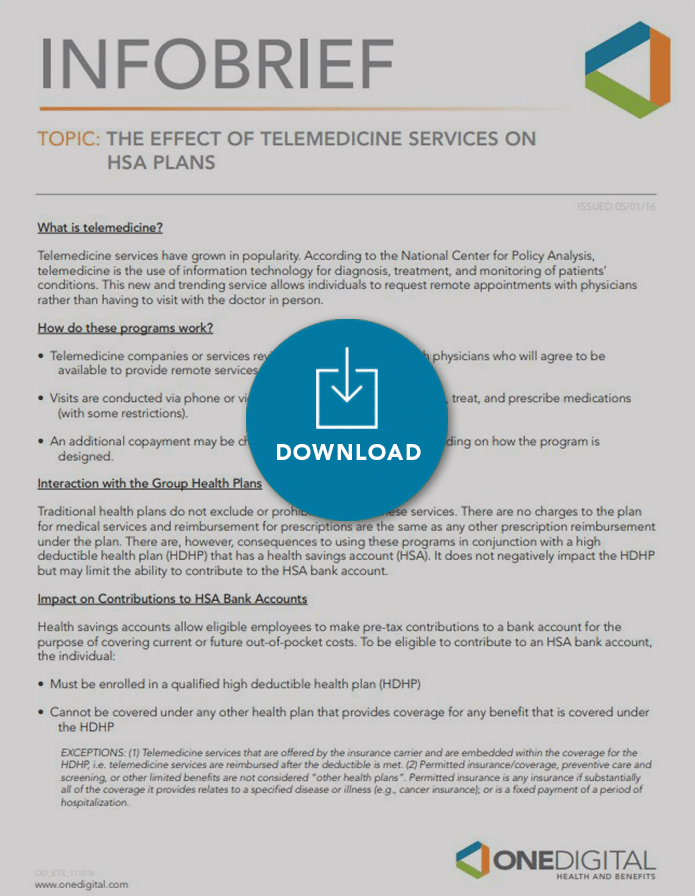What is telemedicine?
Telemedicine services have grown in popularity. According to the National Center for Policy Analysis, telemedicine is the use of information technology for diagnosis, treatment, and monitoring of patients’ conditions. This new and trending service allows individuals to request remote appointments with physicians rather than having to visit with the doctor in person.How do these programs work?
- Telemedicine companies or services review, certify, and contract with physicians who will agree to be available to provide remote services.
- Visits are conducted via phone or video and doctors can review records, treat, and prescribe medications (with some restrictions).
- An additional co-payment may be charged at the time of service, depending on how the program is designed.
Interaction with the Group Health Plans
Traditional health plans do not exclude or prohibit the use of these services. There are no charges to the plan for medical services and reimbursement for prescriptions are the same as any other prescription reimbursement under the plan. There are, however, consequences to using these programs in conjunction with a high deductible health plan (HDHP) that has a health savings account (HSA). It does not negatively impact the HDHP but may limit the ability to contribute to the HSA bank account.
Impact on Contributions to HSA Bank Accounts
Health savings accounts allow eligible employees to make pre-tax contributions to a bank account for the purpose of covering current or future out-of-pocket costs. To be eligible to contribute to an HSA bank account, the individual:
- Must be enrolled in a qualified high deductible health plan (HDHP)
- Cannot be covered under any other health plan that provides coverage for any benefit that is covered under the HDHP
EXCEPTIONS: (1) Telemedicine services that are offered by the insurance carrier and are embedded within the coverage for the HDHP, i.e. telemedicine services are reimbursed after the deductible is met. (2) Permitted insurance/coverage, preventive care and screening, or other limited benefits are not considered “other health plans”. Permitted insurance is any insurance if substantially all of the coverage it provides relates to a specified disease or illness (e.g., cancer insurance); or is a fixed payment of a period of hospitalization.
Since telemedicine provides services for many diseases and illnesses, it is not exclusively preventive care or screening and is not a fixed payment for hospitalization services, it does not satisfy any of the exceptions above.
Therefore, it constitutes “other health coverage” and its use will prevent any further contributions to the HSA bank account. It is, then, disqualifying coverage if the employer pays a portion of the cost of a telemedicine consultation or the participant pays less than fair market value for access to the consultation, before meeting the HDHP deductible.
Things Employers Should Prepare for When Offering a Telemedicine Program:
- Clearly communicate to employees enrolled in an HDHP that use of the telemedicine benefit will prohibit contributions to the HSA bank account
- Include telemedicine program in any COBRA offer of coverage
- If offering benefits through a cafeteria plan, offer telemedicine contributions as pre-tax elections
- Prepare and file a Form 5500 for any telemedicine plan with 100 or more participants - due no later than seven months following the plan year
For Employers Currently Offering Telemedicine Alongside an HDHP with an HSA Bank Account:
- Discontinue the offer of telemedicine services to those enrolling in the HDHP and who have or will have, an HSA bank account, until the time that any new regulatory guidance is rendered
- For your records: Use this notice to document your notification of this development and document any resulting change in policy and procedure with regards to offering a telemedicine program
Benefits of Telemedicine Programs:
As consumers become more accustomed to remote medical treatment, the health industry anticipates resulting benefits to include:
- ability to obtain treatment quicker;
- no wait times or limited wait times;
- lower cost per service than a medical office visit, urgent care, or emergency room;
- more convenient treatment venues for those that have difficulty ambulating or traveling to appointments; and
- ease and expediency of services to patients needing frequent monitoring.
DOWNLOAD THE INFOBRIEF: The Effect of Telemedicine Services on HSA Plans






